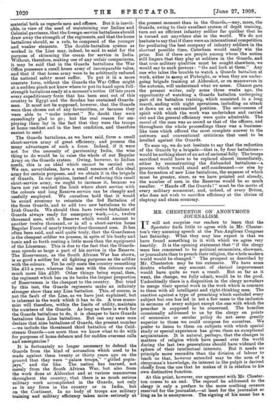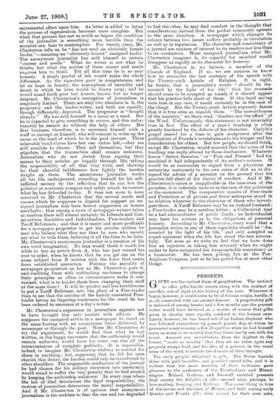MR. CHESTERTON ON ANONYMOUS JOURNALISM.
IT will not surprise our readers to learn that the Spectator finds little to agree with in Mr. Chester. ton's very amusing speech at the Pan-Anglican Congress last Saturday. What they may less expect is that we have found something in it with which we agree very heartily. It is the opening statement that "if the clergy were less concerned to be political economists, showmen, or journalists than to preach their religion, the whole modern world would be changed." The prospect as described by Mr. Chesterton may be too extensive. We have some doubts whether any amount of clerical improvement would have quite so vast a result. But so far as it went, the change, we fully admit, would be to the good. Undoubtedly there is a disposition in the clergy nowadays to merge their special work in the work which is common to them with all intelligent and right-thinking men. The reaction against a type of preaching which excluded every subject but one has led in not a few cases to the inclusion in sermons of every subject except the one with which the preacher is supposed to be concerned. The homilies occasionally addressed to us by the clergy on points of economics or secular policy do not seem greatly superior to those we could compose for ourselves. We prefer to listen to them on subjects with which special study or special experience has given them an exceptional acquaintance. It is natural, perhaps, that the changes in matters of religion which have passed over the world during the last two generations should have widened the sphere of their intellectual interests. But it needs no principle more recondite than the division of labour to teach us that, however extended may be the area of a clergyman's knowledge, its interest in the pulpit is derived chiefly from the use that he makes of it in relation to his own distinctive function.
At this point, however, our agreement with Mr. Chester- ton comes to an end. The reproof he addressed to the clergy is only a preface to the more scathing censure reserved for the journalist,—at least for the journalist so long as he is anonymous. The signing of his name has a saeramental effect upon him. As letter is added to letter the process of regeneration becomes more complete. But when that process has not so much as begun the condition of the journalist is something more terrible than the morafist can bear to contemplate. For twenty years, Mr. ChestedOn tells us, he "has not read an obviously honest leader,"—meaning an "obviously honest" unsigned leader. The anonymous journalist has sold himself to certain "causes and needs." What he writes is not what lie thinks, but what the service of these causes and needs requires him to think. Yet all this time he is so near honesty. A single panful of ink would make the whole difference. As the signature grew in completeness, and Jet us hope in beauty, the atmosphere of unreality and deceit in which he lives would be blown away, and he would stand forth poor but honest, known but no longer despised. Mr. Chesterton's conception of journalism is singularly limited. There are only two elements in it, the proprietor, and the leader-writer, and both are equally, though differently, depraved. The proprietor is "bought already." He has sold himself to a cause or a need. But he is expected to give something in return, and this unfor- tunately he cannot do without the help of others. His first business, therefore, is to surround himself with a staff as corrupt as himself, who will consent to write up the cause or the need of which he is the paid servant. These miserable bond-slaves have but one virtue left,—they are still sensible to shame. They sell themselves, but they stipulate that the transaction shall remain unknown. Journalists who do not shrink from signing their names to their articles go happily through life, taking the responsibility of all that they *rite, and showing by their cheerful indifference how lightly the burden -weighs on them.. The anonymous journalist works all his life underground, consoling himself for his self- inflicted • secrecy by the reflection that he can box the political or economic compass and safely attack to-morrow what he has defended to-day. It does not seem to have occurred to Mr. Chesterton that the several needs and causes which he supposes to depend for support on un- signed journalism may have honest supporters or honest assailants ; that among a score of newspaper-writers taken at random there will almost certainly be Liberals and Con- servatives, Socialists and Individualists, Free-traders and Tariff Reformers ; and that it is easier and more profitable for a newspaper proprietor to get his articles written by men who believe what they say than by men who merely say what lie tells them, believing it all the time to be false. Mr. Chesterton's anonymous journalist is a creation of his own vivid imagination. No man would think it worth his while to buy an article from A, who has just turned his coat to order, when be knows that he can get. one on the same subject from B written with the force that comes from established conviction. . Putting the morality of newspaper proprietors as low as Mr. Chesterton puts it, and crediting them with unblushing readiness to change their, principles as oftea as circumstances make it con- venient, what is to hinder them from changing their staff at the same time? It will be quicker and less troublesome to put a Tariff Reformer into the place of a Free-trader than to see that the articles of the hastily converted Free- trader betray no lingering tenderness for the creed he has been ordered to renounce at a day's notice.
Mr. Chesterton's experience in journalism appears not to have brought him into contact with editors. He supposes the unsigned article in a newspaper to stand on the same footing with an anonymous letter delivered by messenger or through the post. Were Mr. Chesterton to try the experiment, lie would find that what he had written, in the happy assurance that the authorship would remain unknown, would have for some one else all the inconveniences of complete publicity. It is impossible, indeed, to imagiue Mr. Chesterton wishing to conceal his share in anything ; but, supposing that he did for once cherish this desire, the burden would only be transferred to other shoulders.' The responsible conductors of the journal he had 'chosen for his solitary excursion into anonymity woula stand to suffer the very penalty that he had evaded by keeping the authorshipanknown: 'In every case where the law of libel determines the legal responsibility, the custom of journalism determines the moral responsibility. And if Mr. Chesterton is of opinion that anonymous journalism is too reckless to fear the one and too degraded . – to feel the other, he may find cemfert in the thought that considerations derived from the pocket commonly operate in the same direction. A newspaper which changes its colours between two issues suffers probably in circulation as well as in reputation. The character and consistency Of a journal are matters of interest to its readers not less than to its conductors. Were unsigned journalism what 'Mr. Chesterton imagines it, its capacity for mischief would disappear as rapidly as its character for honesty.
Mr. Chesterton is, we believe, a member of the Church of England. If so, we are anxious to know bow be reconciles the last sentence of his speech with the Twenty-sixth Article of Religion. It is right, he thinks, that a journalist's words " should be dis- counted by the light of his life," that his counsels should cease to be accepted as timely if it should appear that his practice falls short of them. If this bard saying were true in any case, it would certainly be in the case of the clergy. But the Twenty-sixth Article expressly denies that it is true even as regards them. "The unworthiness of the minister," we there read, "hinders not the effeat" 9f the Word. Unfortunately, this statement is not invariably true in fact. The effect of a man's teaching is often greatly hindered by the defects of his diameter. Carlyes gospel ceased for a time to gain acceptance after. the publication of Froude's revelations as to his temper and 'his consideration for others. But few people, we should think, except Mr. Chesterton, would contend that the value of his teaching was really altered by these disclosures.. Whatever lesson " Sartor Resartus " or "Past and Present" had foa mankind it had independently of its author's 'actions. ..1* would be as reasonable to expect from a physician an unvarying conformity to his own rules of diet. as to dis- regard the advice of a moralist on the ground that 'MS practice fell short of his' theory of conduct. And 11' Mt., Chesterton's canon is inapplicable in the case even of the preacher, it is infinitely more so in the case of the politician or the economist. The comparative results of Free-trade and Protection or of private and State enterprise no relation whatever to the character of those who investi-, gate them. A Tariff Reformer may be an unkind husband,; a Free-trader may be a careless father ; a Collectivist may be a bad administrator of public funds ; an Individualist. may have lax notions as to the obligations of personal honesty. According to Mr. Chesterton, every word that- a journalist writes in any of these capacities should be "dis- counted by the light of his life," and only accepted as sound argument when the life has stood the test success- fully. Yet even as we write we feel that we have done him an injustice in taking him seriously when we .ought rather to have recognised his irreproachable consistency as a liumourist. He has been poking fun at the Pan- Anglican Congress, just as be has poked-fun at most other things.























































 Previous page
Previous page